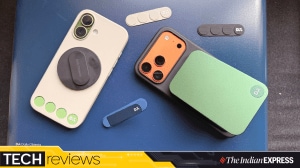A boy’s giftto Africa
...

‘‘The people were just walking so much,’’ Winston said. ‘‘It was such a hard sight to see. I couldn’t take it.’’ When the fifth-grader returned home to Arlington, Virginia, he brainstormed with his mother on how to get people from Point A to Point B other than on two feet. Their answer: on two wheels.
Four months after his trip, the boy organised a bike collection in Arlington. People pulled up in minivans, sport-utility vehicles and hatchbacks to give away bikes that were too old, too small or too rusted. Winston hoped to collect 75 bikes to send to Namibia, in southwest Africa. He wound up with 160 and had a few calls to pick up more. ‘‘It’s amazing,’’ he said. ‘‘We got twice as many as our goal.’’
Winston pulled together the event with the help of his mother and a savvy that belies his age: He publicised his efforts by creating a website, contacting the media, passing out fliers at stores and holding an assembly at Nottingham Elementary School with a representative from the Namibian Embassy at his side. Dixie Duncan, Winston’s mother, said her son has always been sensitive to the needs of others and aware of poverty around the world as a result of their frequent foreign travel.
Last week, Winston was talking about applying for a grant to continue his work, as well as holding a big bike collection on Earth Day. ‘‘I want to try to make it bigger,’’ he said.
The bikes came in all sizes and colors as owners wistfully parted with birthday or Christmas gifts, that mode of transportation that got them to work or in shape. ‘‘I paid $400 for that bike,’’ said Mary Lynn Skutley, 51, as a volunteer wheeled away her 15-year-old, silver 12-speed Raleigh with the pink bottle holder. ‘‘I didn’t even spend that much for a car. I always bought my cars used.’’ Skutley has replaced the bike with another Raleigh. This time, she paid $550.
For 12-year-old Emily Herring and her mother, Anne Mayberry, parting with Emily’s two-year-old, three-speed Raleigh prompted a brief debate. ‘‘It was pink,’’ Emily said. ‘‘Purple,’’ Mayberry said. ‘‘Pinkish-purple. Magenta,’’ Emily said. Mayberry, 50, said they were giving the bike away not only to remove clutter but also to donate to a good cause. Emily had outgrown the bike. ‘‘We thought we should give it where they could use it,’’ Mayberry said.
Duncan coaches her son’s basketball team and got the players to help. The youths, their siblings and parents removed the pedals from each bike and tightened the handlebars to make them easier to ship. Winston set up a nonprofit group called Wheels to Africa, and he contacted Bikes for the World, an Arlington-based organisation that ships bicycles to developing countries, including some in Africa. To defray shipping costs, Winston collected $10 from each donor.
Bicycles are expensive commodities in countries in Central America and Africa, where they generally are imported, said Keith Oberg, director of Bikes for the World. ‘‘We’re so affluent here. We discard these bikes,’’ he said. ‘‘In some countries, it can mean a child can continue to go to school.’’ Oberg said the bikes will be reassembled by the Bicycling Empowerment Network, an organisation in southern Africa that promotes the use of bicycles so poor communities can have low-cost access to employment, health care and education. And what is Winston riding now? ‘‘Well, actually, I don’t have a bike,’’ he said. He had donated all of his bicycles to Wheels to Africa.


- 01
- 02
- 03
- 04
- 05





























